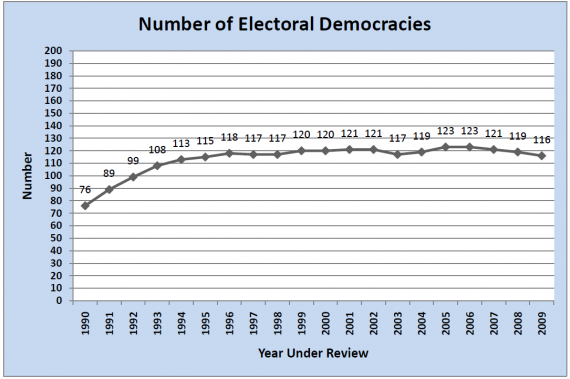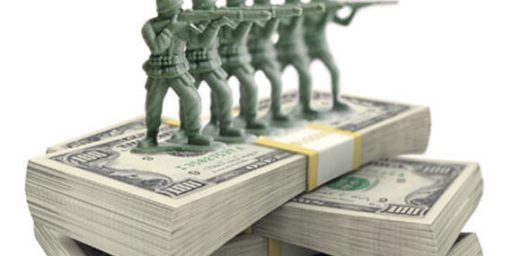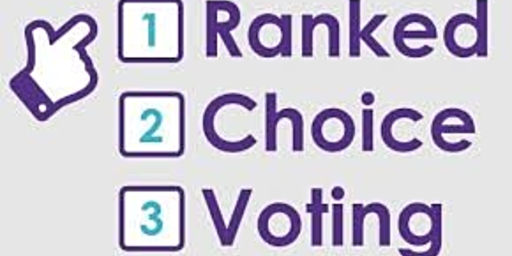Does Defense Spending Increase Freedom?
Tracking "freedom" and American defense spending provides some interesting insights.
In a rather odd posting at RealClearWorld‘s Compass blog titled “Defense Spending and Freedom,” Greg Scoblette argues:
If I’m reading this op-ed from Danielle Pletka and Thomas Donnelly correctly it sounds like they don’t want the Republican party (or the Tea Party) to cut defense spending. Which is fine, so far as it goes. But they also seem to insist that the desire not to cut defense spending is somehow tied to protecting “freedom” at home and abroad.
Is there a correlation between U.S. defense spending and global freedom? There doesn’t appear to be: in the period 1990-2000, as U.S. defense budgets fell, the number of countries ranked “free” by Freedom House grew slightly. Since 2000, as defense budgets grew, the number of countries ranked “free” stayed pretty much the same – the trend lines toward greater global freedom had actually turned negative during the years 2006-2009.
In other words, if you want to make an argument for why the U.S. should continue to devote plus or minus X amount of dollars to defense expenditures, I don’t think “freedom” has much to do with the case one way or the other.
My initial response to this was a tweet that this was “Possibly the dumbest piece ever on RCW.” This prompted RCW editor Kevin Sullivan to ask for “more of a counter-argument than that.” So, I elaborated at great length in a New Atlanticist piece titled “Freedom and Defense Spending” which is replete with twenty seven eight-by-ten color glossy photographs with circlesand arrows and a paragraph on the back of each one explaining what each one was to be used as evidence against Scoblette. Or, at least, some charts cribbed from the same Freedom House report.
The key points:
- Pletka and Donnelly’s “freedom” argument isn’t about some vague notions of the overall amount of it on the planet as measured by Freedom House. They’re exhorting their countrymen to fight terrorism and the forces of extremism head on in foreign lands.
- The increase in freedom in the 1990s can certainly be partly attributed to the Reagan defense buildup
- Freedom has been on the rise by almost every measure since said buildup
- Incremental drop-offs in freedom over the last three years are rather hard to tie to our defense spending
- Freedom is up in the places where we’re actively engaged
Now, there are some pretty interesting arguments in support of the position that our massive defense spending isn’t increasing our freedom in any meaningful way. Indeed, Republican skeptics like myself seem to be the primary target of the Pletka and Donnelly op-ed. But it has to be addressed on its own terms.







Are they just looking at foreign measures of freedom. Certainly the Patriot Act took away some not insignificant pieces of freedom, and that coincided with a rather marked increase in defense spending.
I think there’s a level of spending up to which defense spending is freedom-enhancing, above it there is a diminishing return to scale, and at some point it’s probably freedom-reducing. Where we are precisely depends largely on where you sit.
In my view we are far, far above the point at which we are realizing diminishing returns to scale. I’m not prepared to say that we’ve reached the point where there’s less freedom because of our spending. Some of that depends on whether you think there is more freedom in Iraq, Afghanistan, and Pakistan subsequent to our invasions of the first two or not.
We may have increased freedom in Iraq and Afghanistan over the last 10 years. Or not. I think it’s a near thing. I think there’s probably less freedom in Pakistan than there was 10 years ago.
I’m also wary of the graph at the top of the post. I realize that in a Westphalian world all countries are equal but in the real empirical world is that really the case? Does a democratic India have the same value as a democratic Maldives?
“Freedom is up in the places where we’re actively engaged”
Without a list of the countries concerned it’s hard to judge but this sounds a suspect notion. I suspect many of the “countries” with greater “freedom” include many of the nations that have come into being since the collapse of the soviet union. I suppose notionally many of them are more free but in reality I suspect there’s little practical difference. God knows what any of this has to do with Reagan.
And exactly what do we mean by “freedom”? In US history, often we deem a country to be free when we’ve helped the military overthrow a democractically elected government and install a dictatorship. So Chile was under the yoke of tyranny when they elected a Socialist who threatened to nationalize certain industries, but gloriously free when Pinochet was torturing and murdering anyone who spoke against him.
Also, I think the graph is very misleading. Visually it suggests that the number of electorial democracies is relatively flat over time. On the contrary, the data indicates that the number is up 50% since 1990!